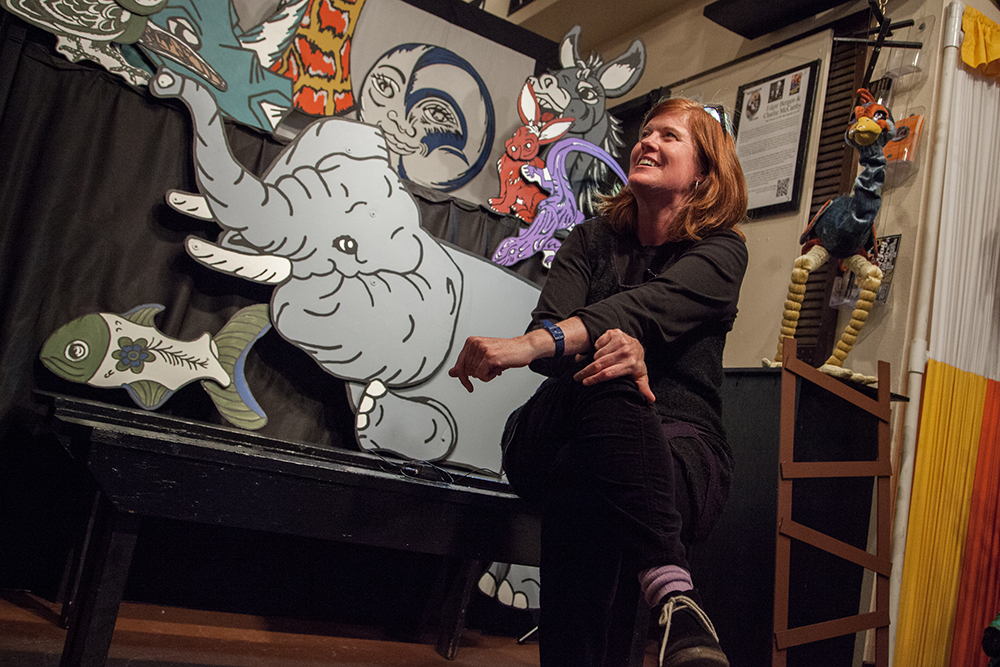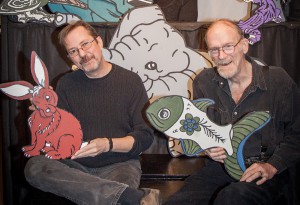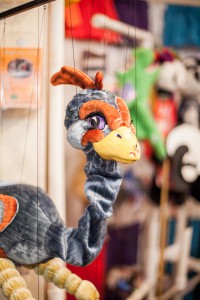
Professor Betsy Ubiergo takes a moment from putting the finishing touches on some of the puppets she helped create at the Olde World Puppet Theatre studios during her sabbatical.
In a strange way, Spanish professor Betsy Ubiergo has the cruelty of children to thank for inspiring her sabbatical project, which will be unveiled at Clark College’s Día del Niño/Día del Libro festival, held May 9 in Gaiser Student Center.
Ubiergo and her Spanish-born husband are raising their daughter, Mar, to be bilingual in both English and Spanish. But Mar began refusing to speak Spanish at home after classmates at her elementary school told her she was “too blonde to speak Spanish.”
“She’d come home from school and say, ‘Mom, I can’t speak Spanish,'” Ubiergo recalled. “But then she’d grab a doll and make the doll speak in Spanish. She’d relax once it wasn’t her on the spot. The doll would speak great Spanish.”
Ubiergo began wondering if this same technique could be used to help her students at Clark, who often seemed to forget their language skills as soon as they had to use them in front of other people. “There’s a lot of research going on right now regarding performance-based language learning,” said Ubiergo. “I thought, maybe if my students had something to hide behind, they could relax and get more from the experience.”

Steven Overton and Martin Richmond of the Olde World Puppet Theatre Studios said they designed the puppets to be both easy for students to use and respectful of the source material’s cultural aesthetics.
Ubiergo applied for and received a two-quarter sabbatical to spend creating a series of large puppets based on works of Spanish literature, as well as the training to be able to help her students use them. To help craft the puppets, she turned to Steve Overton and Marty Richmond of Portland’s Olde World Puppet Theatre Studios, who spent hundreds of hours working to design, craft, and coordinate the 33 puppets.
“We just really loved what Betsy was doing,” said Overton. “It’s promoting literacy, and language, and the classics. We were really happy to be part of it.”
The puppets are based on three different children’s stories, each by a major figure in Spanish-language literature: El Elefante y Su Secreto (The Elephant and his Secret) by Chilean poet Gabriela Mistral; Platero y Yo, by Spanish poet and writer Juan Ramón Jiménez; and Jaco by André Dahan, a French writer and illustrator whose children’s books have been translated into numerous languages. Ubiergo has created scripts from each story; students in her spring quarter Spanish 123 class are currently learning the plays and will be performing them at Clark’s annual Día del Nino/Día del Libro festival, an evening celebration of Latino culture that always includes food, music, dance and a host of other family-friendly activities.

Jaco the Bird is the star of one of the bilingual puppet skits created by Spanish professor Betsy Ubiergo.
“It will be nice because everyone can get something different from this,” said Ubiergo. “For my students, they’ll have a chance to learn Spanish in a new and non-threatening way, and to interact with native Spanish speakers. For the children there who speak Spanish, this may introduce them to some important examples of Spanish-language literature that they may not have been familiar with—and because they’ll be able to help my students out if they forget a word, it validates their experiences as Spanish speakers. And for English-speaking children, the plays are bilingual, and the puppets make it engaging even when they don’t recognize the language.”
Ubiergo added that since the puppets were part of her sabbatical project, they are now Clark College property and will be available for future productions and lessons. In fact, she made sure to request that Overton and Richmond make the puppets easy to disassemble and pack for traveling, because she already has plans to use them in a service learning project during the college’s next study abroad trip to Mexico during Spring Break 2015.
Photos: Clark College/Jenny Shadley


